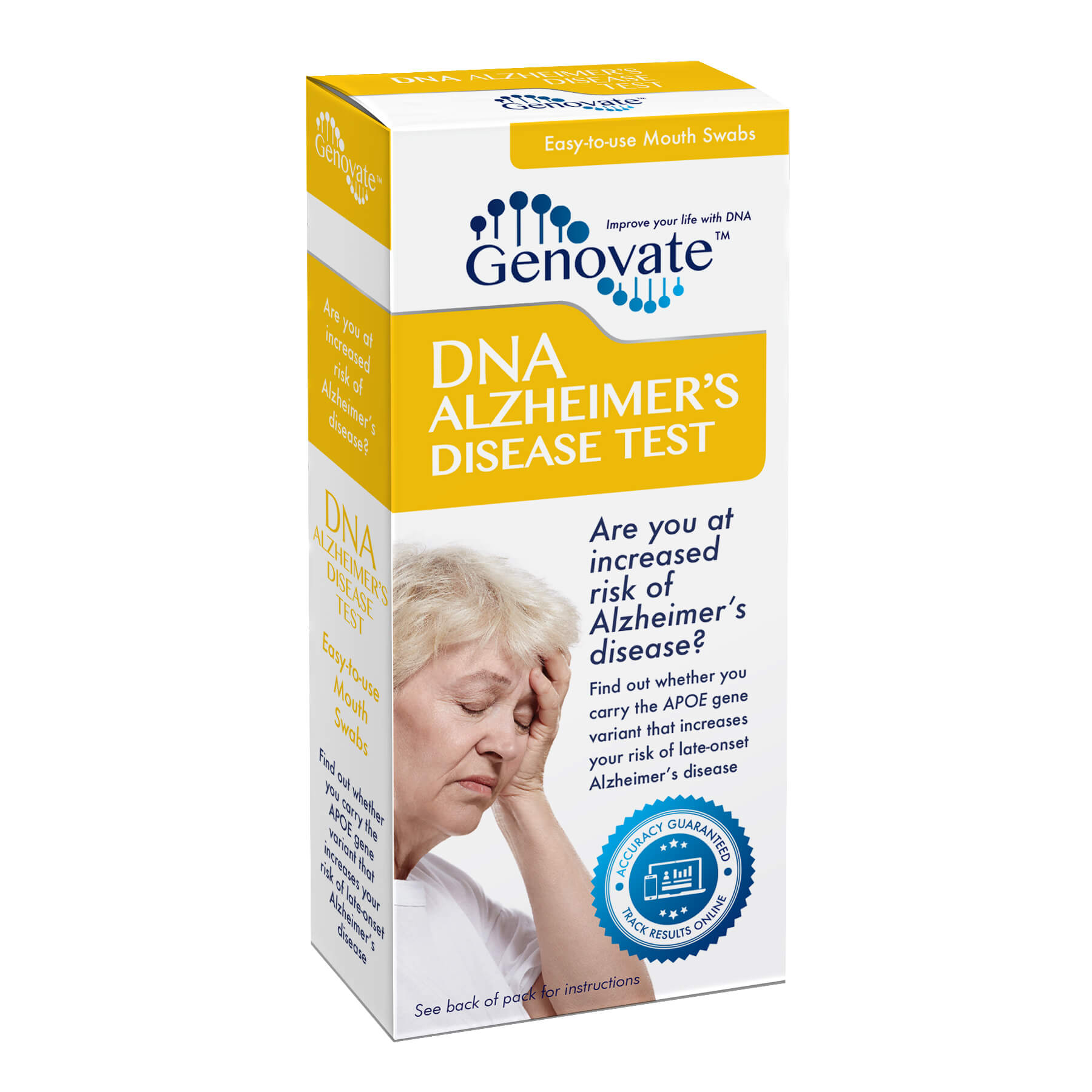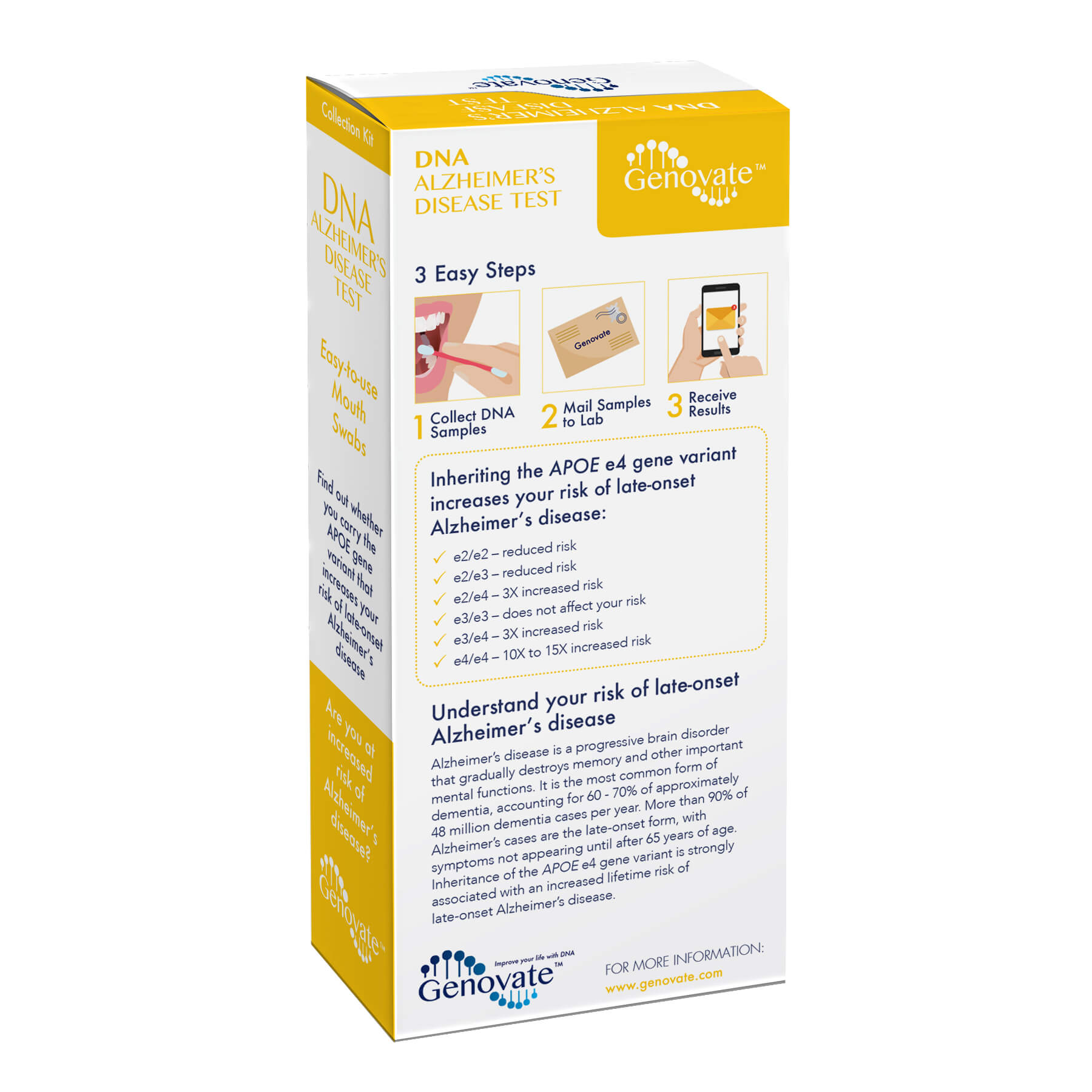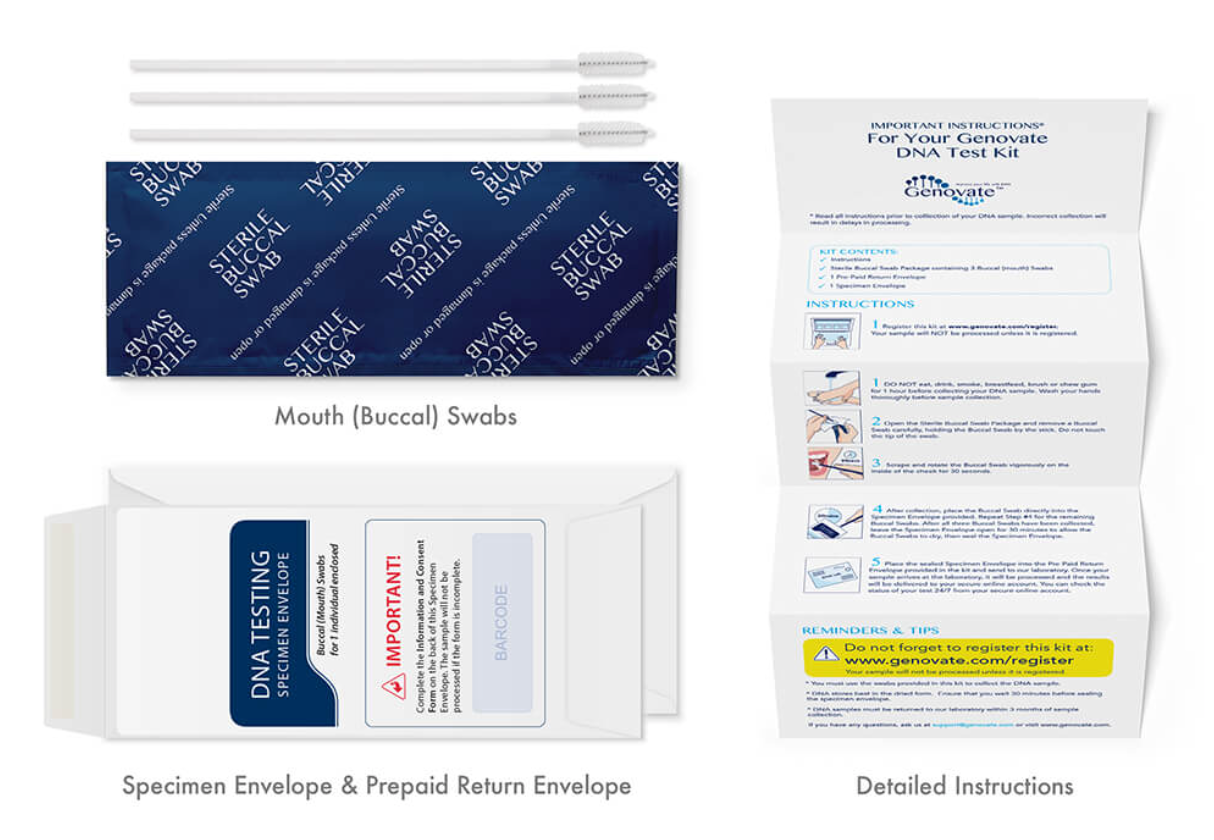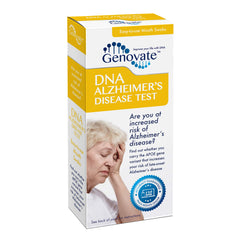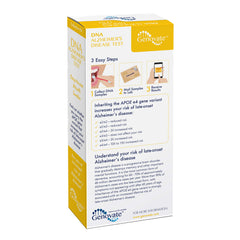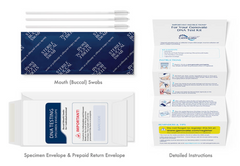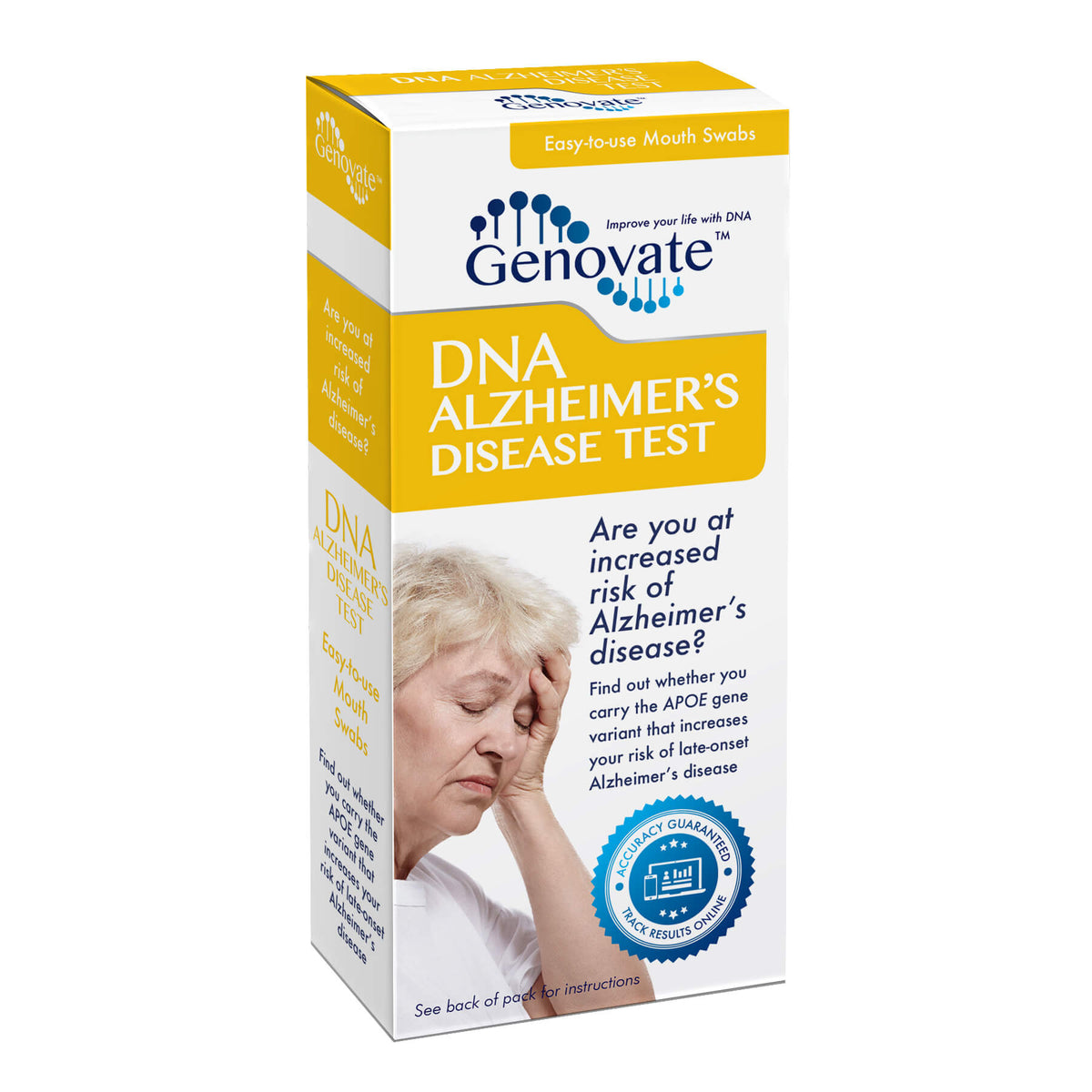Alzheimer's Disease Risk DNA Test
- Regular price
- $195.00
- Regular price
-
$230.00 - Sale price
- $195.00
- Unit price
- per
Couldn't load pickup availability
Description
xDiscover your genetic predisposition for late-onset Alzheimer’s Disease with the Genovate Alzheimer’s Risk DNA Test Kit. This easy-to-use, at-home test is designed to detect the presence of the APOE e4 variant, which is linked to 3- to 15-fold increased risk of developing late-onset Alzheimer’s.
- Detects three common APOE variants (e2, e3, e4)
- Easy at-home sample collection with painless mouth swabs
- 100% private and confidential online results
DESCRIPTION:
Alzheimer’s disease (AD) is a progressive, irreversible brain disorder that gradually steals someone’s memory and thinking abilities. It’s the most common cause of dementia, impacting millions globally. While age is the biggest risk factor, genetics, family history, and certain health conditions can also play a role. Early detection and lifestyle changes can help manage symptoms and potentially slow the progression of the disease.
What’s Happening in the Brain?
Research has identified two key players in AD progression: plaques and tangles.
- Plaques are sticky clumps of protein (beta-amyloid) that disrupt communication between nerve cells, like static on a radio.
- Tangles are caused by a structural protein (tau) becoming tangled and dysfunctional, hindering the cell’s ability to transport nutrients and other vital components.
As plaques and tangles accumulate, brain cells die, leading to the characteristic memory loss and cognitive decline seen in AD. By taking this test, you can learn your risk and begin implementing lifestyle changes to promote brain health.
THE GENETICS:
SYMPTOMS:
The symptoms of late-onset Alzheimer’s disease typically start out mild and progressively worsen over time. The disease is often diagnosed in several stages: preclinical, mild (early stage), moderate, and severe (late stage). Some of the common symptoms and warning signs of late-onset Alzheimer’s disease include:
Early Stage
AD often begins with mild memory lapses, like forgetting names or misplacing items. These may seem harmless, but over time, they worsen, impacting daily life.
- Memory problems, such as forgetting events or personal history
- Decline in non-memory aspects of cognition, such as finding the right word, trouble understanding visual images and spatial relationships, and impaired reasoning or judgment
- Difficulty completing tasks
- Mood and personality changes
- Increased anxiety and/or aggression
Moderate Stage
- Increased confusion and memory loss
- Withdrawal from social activities
- Inability to learn new things
- Difficulty with tasks of daily living
- Behavioral symptoms such as social withdrawal, depression, paranoia, and mood changes
Severe Stage
- Complete dependence on others for care
- Inability to communicate effectively
- Severe cognitive impairment
- Weight loss and loss of interest in eating
- No awareness of recent experiences or surroundings
- Increased amount of sleeping
- General physical decline
It’s important to note that the symptoms of Alzheimer’s disease can vary from person to person, and the disease typically progresses slowly through these stages. Early diagnosis and understanding of genetic risk factors can be crucial for proactive health management and care planning.
HOW IT WORKS:
Step 1: Order test kit online
Choose the Alzheimer's Disease Risk DNA Test. Enjoy the convenience of having the kit delivered straight to your doorstep, eliminating the need for any trips outside your home.
Step 2: Collect DNA sample using a painless mouth swab, and mail to the lab in the provided return envelope
Before collecting your sample, make sure to register and activate your test kit online. This step ensures that your sample is correctly processed. Use the painless mouth swab included in your kit, then securely place your sample in the prepaid return envelope provided. Send it back to our laboratory as soon as possible for prompt testing.
Step 3: Receive your results online
Once your sample arrives at our lab, it will be tested with precision and care. Your results will be accessible through our secure online platform, ensuring your personal information remains private and protected. Enjoy peace of mind with our quality guarantee.
Related Products
- Regular price
- $195.00
- Regular price
-
$230.00 - Sale price
- $195.00
- Unit price
- per
- Regular price
- $195.00
- Regular price
-
$230.00 - Sale price
- $195.00
- Unit price
- per
- Regular price
- $195.00
- Regular price
-
$230.00 - Sale price
- $195.00
- Unit price
- per
- Regular price
- $195.00
- Regular price
-
$230.00 - Sale price
- $195.00
- Unit price
- per
- Regular price
- $195.00
- Regular price
-
$230.00 - Sale price
- $195.00
- Unit price
- per
- Regular price
- $195.00
- Regular price
-
$230.00 - Sale price
- $195.00
- Unit price
- per
- Regular price
- $195.00
- Regular price
-
$230.00 - Sale price
- $195.00
- Unit price
- per
- Regular price
- $195.00
- Regular price
-
$230.00 - Sale price
- $195.00
- Unit price
- per
- Regular price
- $195.00
- Regular price
-
$230.00 - Sale price
- $195.00
- Unit price
- per
- Regular price
- $195.00
- Regular price
-
$230.00 - Sale price
- $195.00
- Unit price
- per
Recently Viewed Products
- Regular price
- $195.00
- Regular price
-
$230.00 - Sale price
- $195.00
- Unit price
- per
- Regular price
- $195.00
- Regular price
-
$230.00 - Sale price
- $195.00
- Unit price
- per
- Regular price
- $195.00
- Regular price
-
$230.00 - Sale price
- $195.00
- Unit price
- per
- Regular price
- $195.00
- Regular price
-
$230.00 - Sale price
- $195.00
- Unit price
- per
- Regular price
- $195.00
- Regular price
-
$230.00 - Sale price
- $195.00
- Unit price
- per
- Regular price
- $195.00
- Regular price
-
$230.00 - Sale price
- $195.00
- Unit price
- per
- Regular price
- $195.00
- Regular price
-
$230.00 - Sale price
- $195.00
- Unit price
- per
- Regular price
- $195.00
- Regular price
-
$230.00 - Sale price
- $195.00
- Unit price
- per
- Regular price
- $195.00
- Regular price
-
$230.00 - Sale price
- $195.00
- Unit price
- per
- Regular price
- $195.00
- Regular price
-
$230.00 - Sale price
- $195.00
- Unit price
- per
- Choosing a selection results in a full page refresh.


